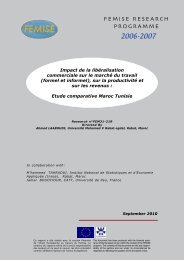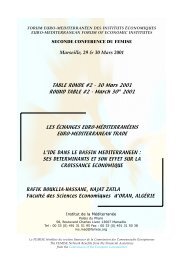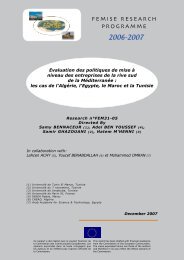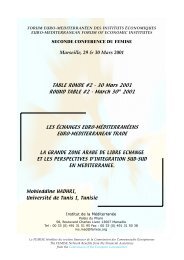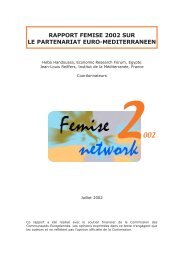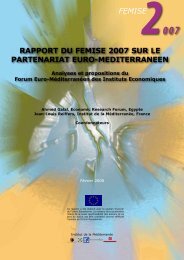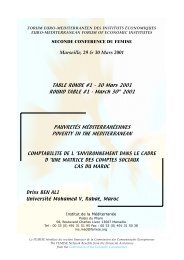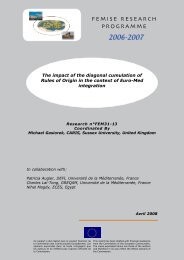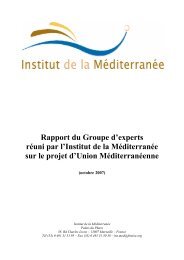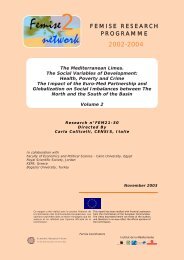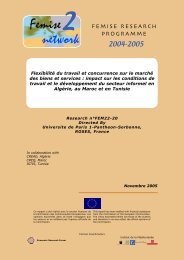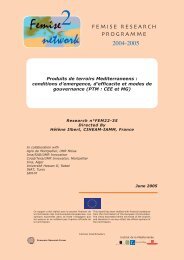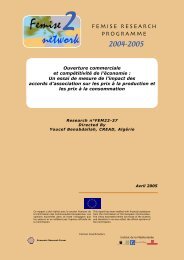Download the report - Femise
Download the report - Femise
Download the report - Femise
You also want an ePaper? Increase the reach of your titles
YUMPU automatically turns print PDFs into web optimized ePapers that Google loves.
Directive No. 93/16/EEC stipulating that medical education in Europe consists of six<br />
years and 5.500 hours of structured schooling. It is also difficult to assess <strong>the</strong> impact of<br />
<strong>the</strong> Bologna model on medical education in Europe as its implementation is still ongoing.<br />
Table I.3.7.1: Medical education in Europe<br />
Country Numerical limits<br />
apply to medical<br />
education<br />
Remarks<br />
Austria No Since 2003 Austria has one private medical school<br />
Belgium Yes since 1997 Government fixes <strong>the</strong> number of new accreditation to practice<br />
Denmark Since 1977 Government fixes <strong>the</strong> number of student places<br />
France Yes since 1971 A decree from <strong>the</strong> Prime Minister fixes <strong>the</strong> numerous clauses<br />
for <strong>the</strong> admission in <strong>the</strong> second year of undergraduate<br />
medical school<br />
Germany Yes Study places are allocated by <strong>the</strong> Central Office for <strong>the</strong><br />
Allocation of places in Higher Education according to a<br />
procedure established by <strong>the</strong> Federal Lander<br />
Greece Yes The Ministry of Education determines <strong>the</strong> number of places<br />
in each medical school on <strong>the</strong> basis of available financial<br />
resources ra<strong>the</strong>r than to match demand and supply<br />
Ireland No There are certain number of state funded places, but colleges<br />
have discretion to take in more students<br />
Italy Yes The number of places for <strong>the</strong> degree in Medicine and Surgery<br />
is determined yearly by a decree of <strong>the</strong> Minister for<br />
Universities and Research<br />
Ne<strong>the</strong>rlands Yes Universities have a “numerus fixus” for medical students<br />
which means that only a limited number of students are<br />
admitted. The great part of available places is assigned by lot.<br />
Norway Yes<br />
Spain Yes The Ministries of Health and Education and <strong>the</strong> National<br />
Conference of University Chairmen set <strong>the</strong> cap<br />
Sweden Yes Medical school intake is controlled by <strong>the</strong> central government<br />
Switzerland Yes since 1998 Some cantons have introduced a numerus clausus<br />
United Kingdom Yes Medical school intake is controlled by <strong>the</strong> government<br />
through <strong>the</strong> funding of university places<br />
Source: OECD (2008) pp. 94-95. Own construction<br />
I.3.8 The new economics of brain drain<br />
The brain drain argument has induced several receiving countries to re think about <strong>the</strong><br />
recruitment of skilled personal. Some European countries, for example, <strong>the</strong> UK is<br />
restricting <strong>the</strong> recruitment of health professionals from most developing countries. The<br />
NHS has applied new restrictions on recruitment of health professionals. But restricting<br />
<strong>the</strong> entry to <strong>the</strong> labour markets might also increase <strong>the</strong> proportion of informal immigrants<br />
into <strong>the</strong> economy. This is linked to <strong>the</strong> phenomenon of brain waste where skilled<br />
immigrants cannot use <strong>the</strong>ir human capital properly, often working on posts for unskilled<br />
staff. This is in contrast to <strong>the</strong> predictions of <strong>the</strong> new economics of brain drain. This<br />
! (%!



